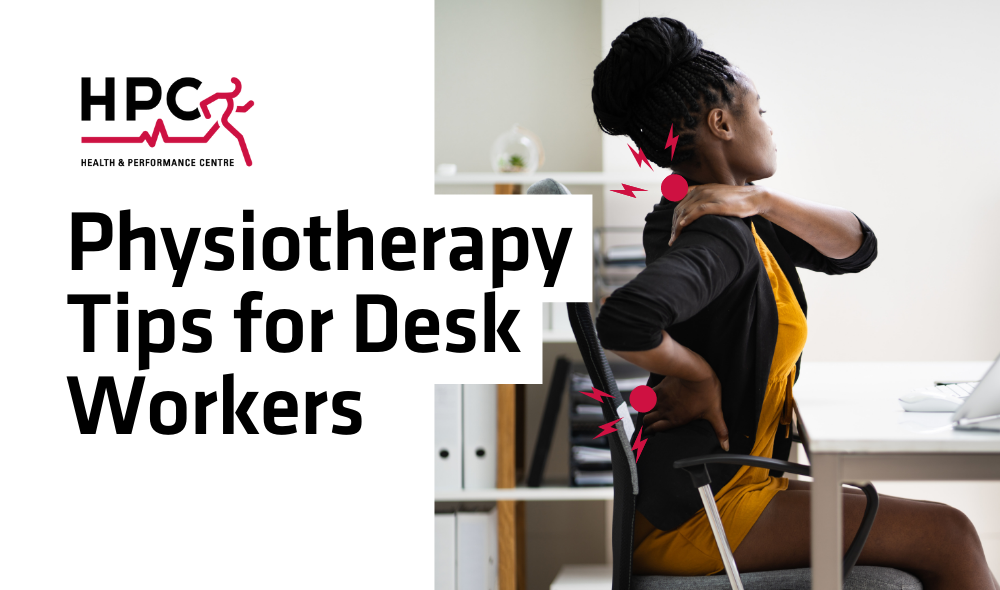Physiotherapy Tips for Desk Workers
How can physiotherapy help office workers or people who live sedentary lifestyles?
If you're a desk worker, specifically one who works from home, you likely have experienced the pain associated with sitting at a desk, looking at a computer for long hours. Did you know that working with a physiotherapist can not only eliminate your pain and your treat injuries but also provide you with help to ensure you are dealing with the root causes? This is an essential step because many office workers (especially those that work from home) don't have much control over their work environment. Meaning the only factor you are in control of is your body. Physiotherapy can help you combat the effects of prolonged sitting. How? Find out below.
Quick take:
- Good posture at the office is essential to prevent pain and injury, but you may need help to find your correct alignment.
- Physiotherapy can help desk workers reduce the risk of physical injuries and concerns while seated at your desk.
- If injured, we recommend consulting with one of our practitioners at HPC, including physiotherapists, chiropractors, and/or massage therapists.
Common desk worker injuries & complaints:
The following symptoms are all associated with working at a desk (these problems may also afflict long-distance drivers):
- Sore wrists and hands
- Lower back pain
- Tightness or pain in hips
- Shoulder pain
- Neck pain
- Poor circulation
- Frequent headaches
- Repetitive Strain Injuries (RSI):
- Overuse injuries that occur as a result of doing more than the body can handle
- Results in trauma to soft tissues, muscles/tendons, and nerves
- Common examples of RSI include carpal tunnel syndrome, rotator cuff injury and tennis elbow
It is important to recognize and acknowledge pain early. Pain is your body’s way of letting you know that it is sensing something that might be harmful in the long term and you should do something about it. Pain should be used as a warning sign, not something to fear.
How can a physiotherapist help, and what exercises are recommended?
A physiotherapist can help to prevent desk-related injuries by teaching the individual how to use the desk correctly and how to adjust the desk to their height. Additionally, the physiotherapist can help to identify any potential problems with the individual's posture and recommend corrective measures. If someone experiences pain, numbness, tingling, or weakness when using their computer, they should seek physiotherapy treatment.
What causes bad posture?
Office work requires you to sit at a computer or use electronic devices, which requires your body to direct itself forward in various ways (a neck forward head posture, rounded shoulders, arched back, arm placement on a desk, etc.). Office workers may also develop other posture-related problems, including scoliosis, lordosis, and swayback or flat back. Physiotherapy for office workers is aimed at fixing bad posture and relies on a patient-specific approach designed to find weak muscles and imbalances. After finding the problem area, the next step is strengthening the muscles and/or loosening stiff joints.
Recommended exercises for bad posture:
- Chin tucks
- Wall angels
- Blackburn exercises
- Cable rows
Note that physiotherapy for injuries is patient-specific because injuries are not the same. That means the recommended exercise regime will be based on the nature of your injury. For example, if you suffered a back injury. A physiotherapist may recommend pelvic tilts or bird dogs, whereas if it is a hamstring injury, expect hamstring curls and single-leg bridges.
What if the damage is already done?
As mentioned, physiotherapy aims to prevent injury and rehabilitate the body post-injury. The focus is primarily on optimizing strength and restoring function and movement, which requires a hands-on approach that encompasses massages, stretches, and physical activity.
If you're experiencing pain, waiting and/or attempting a "DIY" approach may cause more damage which is why it's essential to consult with a trained professional. If you have muscle or joint problems, physicians will recommend working with a physiotherapist, chiropractor or massage therapist, depending on the issue.
Physiotherapy treatment for office injuries:
Depending on your injury, a physiotherapist may employ any of the following treatments or a combination.
- Exercise therapy to increase strength and flexibility while also reducing pain.
- Soft tissue techniques: pain reduction and increased mobility
- Physiotherapy programs (Physio Pilates: Mat classes and reformer appointments)
- Trigger Dry Point Needling
Preventative measures you can take today to improve your desk setup:
Modifying your workstation setup can greatly reduce the number of injuries and pain you experience while working at a desk. Here are some tips to ensure you are maximizing the safety of your workstation;
- Placing objects used most often within a comfortable arm’s reach and in front of you will prevent overreaching and twisting
- Adjusting your chair to support your back
- Consider your posture
- Having frequent breaks to stand up, walk around, and stretch (see above)
- Stay physically active and consider putting aside time each day to be active
